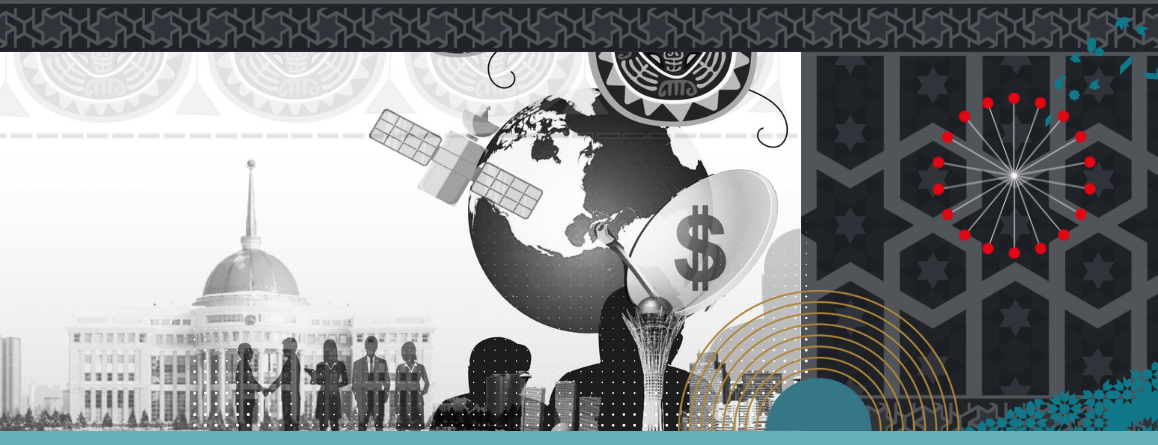Written by: Thomas Mayne, Leila N. Seiitbek, Fatima Kanji and Erin K. Schornick
Kazakhstan stands as one of the strongest examples of a modern kleptocracy, because for the last thirty years the political economy of Kazakhstan has been dominated by an elite coterie of state officials who have used their power to capture the country’s resources. Much of this wealth has been transferred out of the country: the Tax Justice Network has estimated capital flight since Kazakhstan gained its independence in 1991 at approximately $140 billion. Such outflows caused Global Financial Integrity, a Washington, DC based think tank, to rank Kazakhstan 18th in the world for illicit financial flows, with trading partners most responsible for vulnerability to these flows being Netherlands, United Kingdom and Russia.
Over the last several decades, numerous reputable international non-government organisations and media outlets have reported on the active participation of senior government officials and politicians in corrupt activities in Kazakhstan. These reports run the gamut of predatory economic activities, including bribery, misappropriation of state assets, asset expropriation, and fraud. The whole kleptocratic system could even be described to resemble a mafia organisation, where money is generated by the lower rungs of the ladder and passed upward to the consigliere – the government ministers – and onward to the Don himself, the president.
This report takes a look at just one fraction of the country’s economy: the telecommunication sector. Kazakhtelecom JSC, which is majority owned by the Kazakh state, is the key player in the Kazakh telecoms industry and thus plays an important role in generating revenue for the Kazakh economy. The company – which made a $170 million profit in 2019 – holds a monopoly on landline contracts in Kazakhstan, and owns a stake in the largest of the country’s three main mobile phone operators, Kcell, and all of the third largest, Tele2, leaving Beeline as the only government-independent mobile phone provider. Until recently, Kazakhtelecom JSC had different Scandinavian partners in both Kcell (the Telia Company AB) and Tele2 (Tele2 AB).
The report delves into the history of both of these partnerships in Kazakhstan and examines allegations of corruption and cronyism. In recent years, much attention has been focused on Telia’s activities in Uzbekistan, where it was demonstrated by international law enforcement bodies that the company paid bribes to the daughter of the then Uzbek president, resulting in criminal investigations and global settlements totalling nearly a billion dollars. Less attention has been paid to the company’s operations in Kazakhstan, and the deals it struck, which bear similar hallmarks to its corrupt dealings in Uzbekistan. This report attempts to redress the balance, and throw some light on the entities in Kazakhstan that benefited from the deals struck by Telia, and the people who stand behind these deals. The Telia Company and Tele2 AB’s responses to our findings can be found on pages 50 and 31 respectively.
Background
The fact that both European companies have since exited the country does not mean that this report’s findings are of no concern to the international community: it poses important questions for those foreign companies still active in Kazakhstan, and those seeking to do business there, regarding the involvement of politically-exposed people through anonymous company structures. Furthermore, many of the entities that are used to hide the ultimate ownership of shares in Kazakhtelecom JSC and telecom operator KazTransCom are registered in places such as Luxembourg, the Netherlands or the British Virgin Islands, highlighting how such jurisdictions can be used in shadowy dealings in authoritarian regimes. For Kazakhstan, the report raises serious questions over the transparency of Kazakhtelecom JSC, the control of this company and its part-private ownership, and the process through which the state allocates frequencies and other contracts regarding mobile phone telephony.
Part 1 of this report deals mainly with Kazakhtelecom JSC and its owners, whereas Part 2 examines the joint ventures struck by Telia and how they were often obscured by a complex network of layered shell companies that kept the deals’ beneficiaries hidden. However, the information that is available on their directors and shareholders suggests that the transactions benefitted members of the Kazakh political elite, who received millions of dollars in dubious funds. One of the main actors identified by this report is the current Chairman of the National Security Committee of the Republic of Kazakhstan,Karim Masimov.
This is not the first time Masimov has been identified as a possible recipient of corrupt funds. As such, Masimov is one of the key officials in Kazakhstan who supports and benefits from the country’s kleptocratic system, a system built on human rights’ abuses, and a lack of political freedom and civil liberties, where the state apparatus harshly suppresses any criticism or dissent.
The transfer of illicit capital from kleptocracies such as Kazakhstan into the West not only deprives their citizens of much-needed revenue, but it also has a corrosive effect on the jurisdictions where the money ends up: lawmakers’ opinions are swayed by lobbyists, democracy is undermined, house prices are distorted by the influx of dubious capital, and paid-for articles in Western media paint rosy pictures of these nations as flourishing democracies, creating a smoke screen that obscures the truth.
As U.S. Senator Sheldon Whitehouse and General David Petraeus wrote in 2019 that the fight against corruption is more than a legal and moral issue; it has become a strategic one — and a battleground in a great power competition.
This poses a test for the international community’s readiness to address grand corruption. For too long the West has acted as a safe haven for the wealth acquired by corrupt foreign officials, and their cronies.
It is time for the global community to take a stand and advocate for the initiation of investigations in relevant jurisdictions into the sources of wealth of the Kazakh political elite which must ultimately lead to seizure and responsible return of illegally acquired assets to the people of Kazakhstan.
